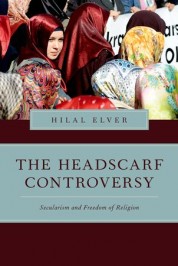The Headscarf Controversy: Secularism and Freedom of Religion

The Headscarf Controversy: Secularism and Freedom of Religion
Hilal Elver
Oxford University Press, 2014
- First global examination of the headscarf controversy
- Provides sociological, legal, and political perspectives on the headscarf controversy
- Shows the crucial influence of the Constitutional Court decisions on the European Court of Human Rights
Hilal Elver offers an in-depth study of the escalating controversy over the right of Muslim women to wear headscarves. Examining legal and political debates in Turkey, several European countries including France and Germany, and the United States, Elver shows the troubling exclusion of pious Muslim women from the public sphere in the name of secularism, democracy, liberalism, and women’s rights.
After evaluating political actions and court decisions from the national level of individual governments to the international sphere of the European Court of Human Rights, Elver concludes that judges and legislators are increasingly influenced by social pressures concerning immigration and multiculturalism, and by issues such as Islamophobia, the” and security concerns. She shows how these influences have resulted in a failure on the part of many Western governments to recognize and protect essential individual freedoms.
Employing a critical legal theory perspective to the headscarf controversy, Elver argues that law can be used to change underlying social conditions shaping the role of religion, and also the position of women in modern society. The Headscarf Controversy demonstrates how changes in law across nations can be used to restore state commitments to human rights.
Readership: Students and scholars of Islam, global politics and religion, feminist studies, women’s rights in Muslim societies, Middle Eastern politics, international human rights law, comparative law, international relations, sociology, and political science
Hilal Elver, Visiting Distinguished Professor, Global and International Studies, University of California, Santa Barbara, United States
Hilal Elver is a research professor at the University of California Santa Barbara, where she has been Distinguished Visiting Professor since January, 2002. Previously she was the UNEP Chair on Environmental Diplomacy at the Mediterranean Academy of Diplomatic Studies in Malta, and taught at the University of Ankara, Faculty of Law, where she received her law degree and Ph.D. She also has an SJD from UCLA Law School. Her publications focus on international environmental law and human rights, specifically in relation to women’s rights.
|